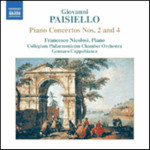
Piano Concertos Nos. 2 And 4
 $25.00
Out of Stock
$25.00
Out of Stock6+ weeks add to cart
GIOVANNI PAISIELLO
Piano Concertos Nos. 2 And 4
Francesco Nicolosi (Piano) / Collegium Philharmonium Chamber Orchestra / Gennaro Cappabianca
[ NAXOS / CD ]
Release Date: Friday 30 November 2007
This item is currently out of stock. It may take 6 or more weeks to obtain from when you place your order as this is a specialist product.
"Francesco Nicolosi plays it with taste and precision… The performances, recorded in the theatre at Caserta by musicians from the Naples opera house, are lively and attentive. An attractive disc."
-- Stanley Sadie, Gramophone, September 2004
"Giovanni Paisiello was trained in Naples and had early successes as an opera composer there and in north Italy. He served as court composer to Catherine the Great in St Petersburg from 1776 to 1784. There, in 1782, he wrote Il barbiere de Siviglia, his most admired comic opera, pre-dating Rossini's work by some 34 years. Returning to Italy, Paisiello spent most of his time in Naples, except for a spell in Paris directing the music for Napoleon's chapel and, incidentally, providing the music for the First Consul's coronation. Most of Paisiello's operas are comic, written in a lively, spirited style, but some are sentimental comedies (e.g. Nina, 1789), warmer and more colourful. Later in his life he wrote more serious works.
The fulsome album notes, by Paolo Isotta, place Paisiello as "a great composer…He stands head and shoulders above the other Italian composers of his generation…". Paisiello had an impressive gift for melody and a highly individual style and idiom that is akin to his contemporary Haydn and even foreshadows Beethoven.
Isotta, who one must assume is an informed Paisiello scholar, is equally fulsome in his praise of the artists featured in these performances recorded in the Royal Palace of Caserta seat of the Bourbon kings. This is located between Naples and Rome and Paisiello's music was often performed there during his lifetime. He speaks of the soloist, Francesco Nicolosi, in the same breath as Arturo Benedetti Michelangeli, praising his "luminosity of sound, his ability to draw out song-like legato qualities of a keyboard instrument." Praise indeed and, I think, deserved. Nicolosi does impress with his lyrical and exuberant and polished playing. And Cappabianca's ensemble delivers poised and elegant accompaniments with attack aplenty as required.
Paisiello composed eight piano concertos. The Piano Concerto No. 2, showing more classical restraint than the Fourth, looks northwards towards Vienna. It begins with an extrovert, forceful Allegro with staccato flute figures echoed by horns. There are also bouncy, assertive piano figures that hardly draw breath for any legato lyricism. A stately Largo again with chattering unison flutes prominent in an extended introduction precede the soloist, hesitant and pensive yet delicate and graceful, supported by pizzicato strings and singing woodwinds. A most attractive movement. The concluding merry Allegretto is another elegant contrivance with fluttering flutes and some material suggestive of the hunt that must have flattered Court audiences.
The Piano Concerto No. 4 in D minor is more interesting. It anticipates Beethoven and even, to my ears, at some moments in the first movement, Chopin. Isotta compares this Concerto to Haydn's Sturm and Drang works. Scurrying along, the opening Allegro is a sturdy creation that, like other Italian compositions of this period, has melodramatic, operatic effects. The contrasting solemn Largo middle movement, comparable to a young Beethoven, sustains the melodrama in melancholy lyricism, the texture lightening as the music progresses, the soloist tracing delicate patterns. Grace and lightness, with a wry touch of humour, return with the concluding Rondo.
The concert opens with the lively, tuneful, five-minute Allegro vivace of Paisiello's Sinfonia d'Opera which is reminiscent of Haydn. Midway between the two concertos is placed the six-minute, three-sectioned Proserpine Overture. The sections are: a furiously energetic Allegro spiritoso, a stately, disdainful Andante and a scampering, comic Allegro. One of Paisiello's greatest operas, Proserpine was also commissioned by Napoleon.
Energetic and lyrical performances of two attractive late 18th century concertos. Recommended to the adventurous music lover. "
-- Ian Lace, MusicWeb, October 2004
"He wrote eight highly individual keyboard concertos which show a natural gift for melody while anticipating the idiom and style of later, greater composers… Alongside a sprightly Sinfonia and Prosperina overture, each is deftly played by Francesco Nicolosi under Gennaro Cappabianca."
-- Anthony Holden, The Observer, 8/8/04
"Francesco Nicolosi plays it with taste and precision… The performances, recorded in the theatre at Caserta by musicians from the Naples opera house, are lively and attentive. An attractive disc."
-- Stanley Sadie, Gramophone, September 2004
"Nicolosi's playing is fluent and luminous. …this is a most attractive recording, needing no apologia whatsoever for its modern-instrument guise."
-- George Pratt, BBC Music Magazine, September 2004
Tracks:
Sinfonia d'Opera: Allegro vivace
Piano Concerto No. 2 in F major
Proserpine Overture in D major
Piano Concerto No. 4 in G minor